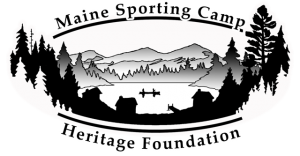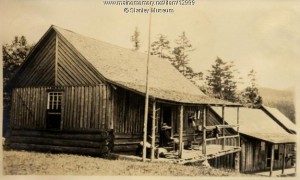The Foundation’s education programs seek to provide the public a better understanding about traditional Maine sporting camps and the important role they play in our State’s history, cultural heritage and economic well-being.
These programs include making information available to the public via this website, and through publication of brochures or pamphlets that are distributed at different venues including sportsman shows, cultural events, and tourist destinations.
Workshops, lectures and public events help establish a local knowledge base that can then be brought to bear on community and resource conservation decisions. Some of these events are:
- Rangeley Region Guides & Sportsmen’s Association Outdoor Sporting Heritage Day, Rangeley (Franklin County).
- Forest Heritage Days – sponsored by the Moosehead Lake Region Chamber of Commerce, Moosehead Historical Society, Natural Resource Education Center, Greenville (Piscataquis County).
- Katahdin Area Wooden Arts/Canoe Festival – sponsored by the Katahdin Area Chamber of Commerce, Medway (Penobscot County).
Other opportunities for public outreach, depending on Foundation resources, include several regional annual agricultural fairs and tourism/travel shows in Maine, New Hampshire and Massachusetts.
The Foundation also enlists the aid of prominent Maine citizens who are willing to participate in these educational activities, speaking engagements, interviews with media outlets, and preparing articles and Op-Ed pieces for publication.
Cultural Heritage
Sporting camps are a major icon of Maine’s outdoor culture and heritage. For over 150 years, Sporting Camps have served the public by offering non-exclusive lodging, meals and recreational access to Maine’s most beautiful and remote natural locations. Many Sporting Camps feature hand-built log cabins that have been in continuous use for over 100 years. An architectural style emerged that is unique to Maine, known simply as the “Maine Sporting Camp Style.”
The “Sporting Camp Experience” is as unique today as it was 150 years ago. These family-run businesses offer rustic cabins surrounded by fantastic wild scenery and wildlife; lost art of providing hearty home-cooked meals and pastries, safe family vacation settings, and traditional outdoor recreation like fishing, hunting, hiking and wildlife watching.
In 1904 there were at least 300 sporting camps in operation in Maine. By 2007, this number had dwindled to fewer than 40. As more commercial camps are lost, this unique part of Maine’s cultural heritage comes dangerously close to losing its critical mass and disappearing altogether — taking with it the valuable public services sporting camps provide and the vital role they play in Maine’s rural economy and outdoor traditions.
Traditions like farming, forestry, hunting and fishing have been lost by a society that has become increasingly urbanized and digitized. Children lack an understanding and appreciation of where our food is raised, how the forests provide such basic items as lumber and tissue paper, and the daily struggles for life that were once so familiar. Sporting camps continue to provide society with an opportunity to experience the natural world, outdoor recreation, and genuine hospitality in a family-friendly setting.
Conservation Ethic
The Foundation’s charitable mission is to preserve the heritage of traditional Maine sporting camps, the role they play in the history and cultural identity of the State of Maine, and to preserve the resources and the experiences they provide for the general public.
The Foundation’s educational activities address the importance of conservation efforts to preserve Maine’s natural resources and the undeveloped, pristine surroundings that most sporting camps rely upon. The Governor’s Council on Maine’s Quality of Place, in its “1st Report of the Governor’s Council on Maine’s Quality of Place” (released on December 4, 2007), concluded that “large tracts of undeveloped land, key scenic parcels, and lands and waters that support wildlife, fishing, farming, forest products industries and recreation and tourism are important economic assets and pillars of the Maine economy.”
North American Conservation Model
A component of Maine’s sporting camp and outdoor traditions, and for a century the single largest force behind land and wildlife conservation, has been the sportsmen who have traditionally come to sporting camps – hunters and fishermen. It was sportsmen who created what is known as the “North American Conservation Model” – now regarded as the single most successful conservation approach ever created.
Sporting camp visitors led the way on many our wildlife conservation efforts, such as promoting scientific wildlife management principles and providing the majority of funds needed to sustainably manage wildlife populations and habitats. In Maine, sportsmen led the way with new activities, such as flyfishing in order to assure future generations could experience our ever-wild, never-stocked, brook trout.


